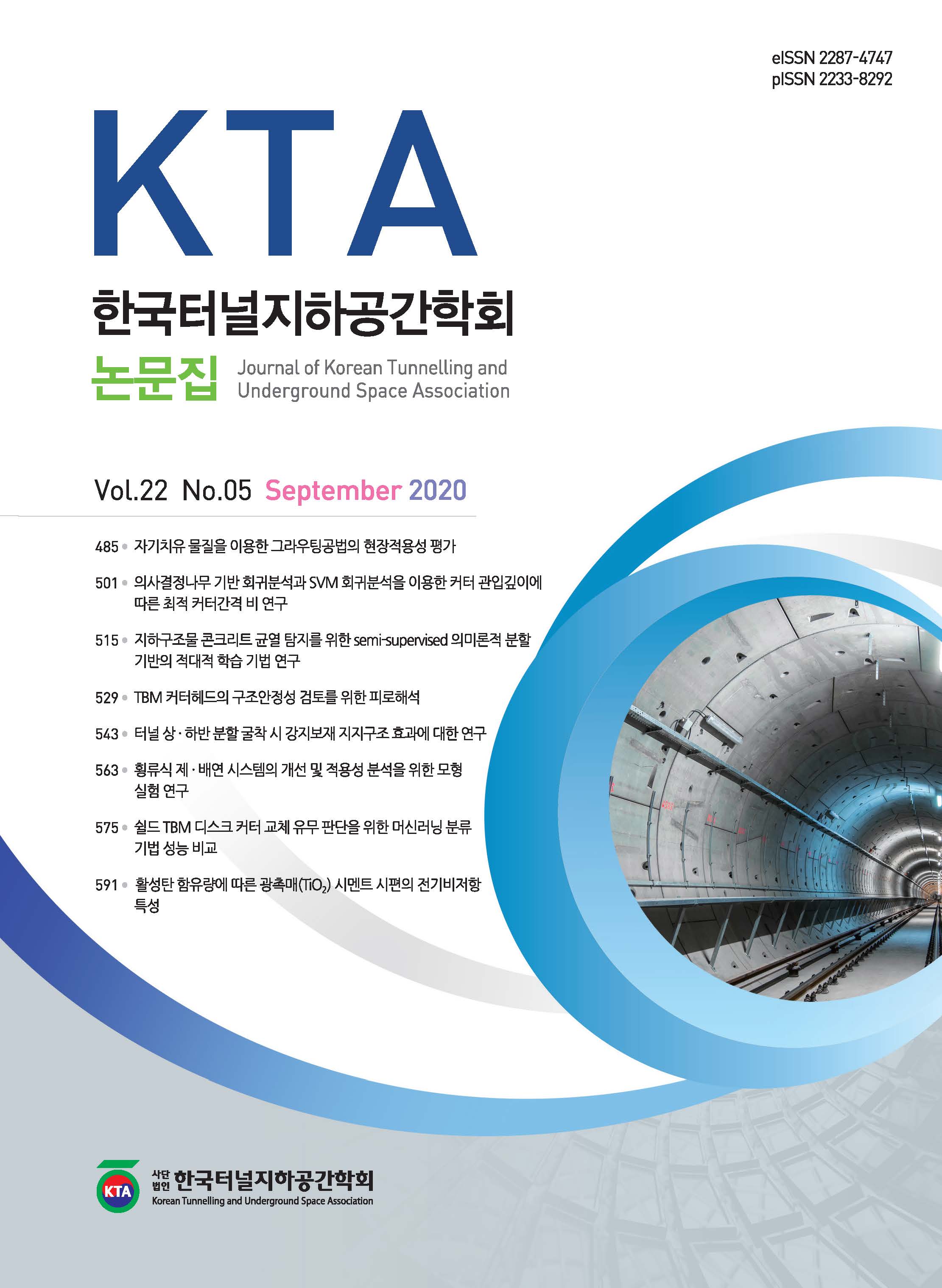- 권한신청
- P-ISSN2233-8292
- E-ISSN2287-4747
- KCI
 ISSN : 2233-8292
ISSN : 2233-8292
구형지하공동 형성이 지표침하에 미치는 영향에 대한 3차원 개별요소해석
The effect of formation of spherical underground cavity on ground surface settlement : Numerical analysis using 3D DEM
이항로 (인하대학교)
송기일 (인하대학교)
초록
지표침하를 발생시키는 다양한 원인 중에 하나로 알려진 지하에서 발생되는 공동은 지반의 불연속적 특징이다. 그러므로 기존의 연속체해석으로 분석하기에는 한계가 있을 것으로 판단된다. 본 연구에서는 지표침하를 발생시키는 구형지하공동에 대해서 개별요소법을 활용하여 분석하였다. 지표침하에 영향을 미치는 구형지하공동의 특성인자로서 지반의 물성치, 구형지하공동의 심도 및 크기를 선택하였고, 각 특성인자들의 값의 변화가 지표침하에 미치는 영향에 대해 분석하였다. 또한 지하공동의 직경에 대한 상대적 깊이와 지표침하의 관계를 분석하였고, 이를 통해 지하공동의 붕괴 예측 및 보강유무를 결정하기 위한 근간을 제시하였다.
- keywords
- 별요소법, 입자유동해석, 구형지하공동, 지표침하, Discrete element method, Particle flow code, Spherical underground cavity, Ground surface settlement
Abstract
The underground cavity known as one of the reasons of ground surface settlement is a discontinuous character. Therefore, it is limited to analyze with continuum analysis. In this research, The spherical underground cavity affecting the ground surface settlement is studied with Discrete Element Method. Ground properties, depth and diameter of the spherical underground cavity are chosen as factors of the spherical underground cavity and the effect of the each factor variations on the ground surface settlement is analyzed. Relative depth to the diameter of the spherical underground cavity is also studied. The result of the research suggests the basis of underground cavity collapse prediction and standard of support.
- keywords
- 별요소법, 입자유동해석, 구형지하공동, 지표침하, Discrete element method, Particle flow code, Spherical underground cavity, Ground surface settlement
참고문헌
1. Brady, B.H.G., Brown, E.T. (1985), “Rock mechanics for underground mining”, George Allen and Unwin., 527.
2. Cho, W.S., Song, K.I., Ryu, H.H. (2014), “Analysis on the behavior of shield TBM cable tunnel: The effect of the distance of backfill grout injection from the end of skin plate”, Journal of Korean Tunnelling and Underground Space Association, Vol. 16, No. 2, pp. 213-224.
3. Ding, X., Zhang, L., Zhu, H., Zhang, Q. (2014), “Effect of model scale and particle size distribution on PFC3D simulation results”, Rock Mechanics and Rock Engineering, Vol. 47, No. 6, pp. 2139-2156.
4. Itasca Consulting Group, Inc.(2015), “Particle Flow Code 5.0 documentation”.
5. Kim, D.S., Joo, G.S., Lee, H.C., Suh, Y.H. (2003), “Geotechnical aspects of tunnel design in karst topology”, Korean society for rock mechanics, pp. 1-11.
6. Kim, J.W., Jeon, S.W., Suh, Y.H. (2004), “A study on the effect of underground openings on the stability of surface structures using scaled model tests”, Tunnel and ground space, Vol. 14, pp. 43-53.
7. Kim, N.Y., Umm, T.W. (2013), “A case study on the Chimney collapse of tunnel under construction”, Proceeding of Korean geo-environmental society, Seoul, pp. 43-53.
8. Kwon, K.S., Park, Y.J., Shin, H.S., Shin, J.H. (1994), “Ground stability assessment for the mining induced subsidence area”, Korean Society for Rock Mechanics, Vol. 4, No. 2, pp. 170-185.
9. Lee, S.D. (2013), “Tunnel mechanics”, CIR, Seoul, pp. 694-699.
10. Lim, H.U., Kim, C.H., Baek, H.J. (2001), “Stability analysis of rock slope in limestone mine by numerical analysis”, Korean Society for Rock Mechanics, Vol. 11, No. 3, pp. 270-278.
11. Potyondy, D.O., Cundall, P.A. (2004). “A bondedparticle model for rock”, International journal of rock mechanics and mining sciences, Vol. 41, No. 8, pp. 1329-1364.
12. Song, K.I., Cho, G.C. (2006), “Effect of spatial distribution of geotechnical parameters on tunnel deformation”, Tunneling Technology, Vol. 8, No. 3, pp. 249-257.
13. Song, K.I., Yoon, J.S., (2015), “Tunnel deformation mechanism”, CIR, Seoul.
14. Suchowerska, A.M., Merifield, R.S., Carter, J.P., Clausen, J. (2012), “Prediction of underground cavity roof collapse using the Hoek–Brown failure criterion”, Computers and Geotechnics, Vol. 44, pp. 325-342.
15. Tanaka, H., Momozu, M., Oida, A., Yamazaki, M. (2000), “Simulation of soil deformation and resistance at bar penetration by the distinct element method” Journal of terramechanics, Vol. 37, No. 1, pp. 41-56.
16. Yoon, J. (2007). “Application of experimental design and optimization to PFC model calibration in uniaxial compression simulation”, International Journal of Rock Mechanics and Mining Sciences, Vol. 44, No. 6, pp. 871-889.
- 다운로드 수
- 조회수
- 0KCI 피인용수
- 0WOS 피인용수

